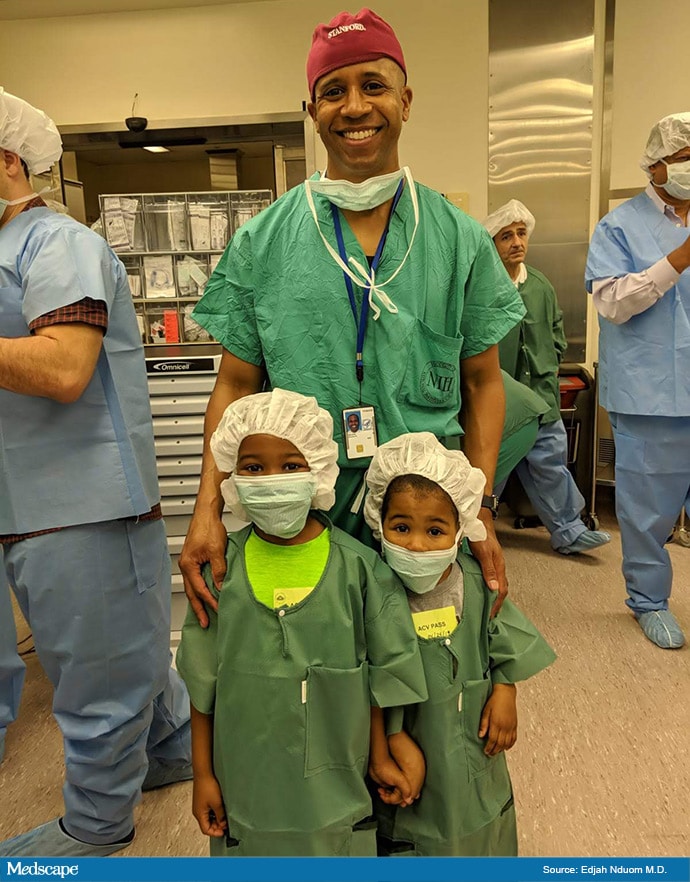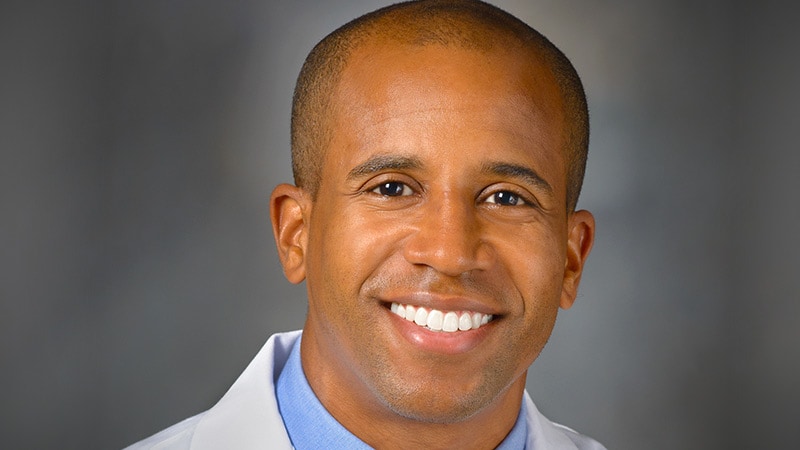Being told the operating room has already been cleaned. Being questioned by patients about where you went to medical school. Being asked for ID every time you enter your own hospital. Being told you don’t look like a doctor. In a series of conversations with Medscape, Black physicians talk about racism they’ve faced in their training and their clinical work, the change they’d like to see, and how they’re coping during this period of both pandemic and racial upheaval.

Edjah Nduom, MD
I was at my first interview for a residency in neurosurgery. One interviewer, the department chair, said he wanted to talk to me about something because I grew up partially in Ghana. I thought he might have a question about travel. Instead, he said, “I’ve been watching all this footage about Hurricane Katrina. I’m so worried about all of these people and how we could help them. What if we got a bunch of cruise ships and sent them to Africa, so they don’t have to deal with all the problems they have here?”
This is an interview for my lifelong dream to be a neurosurgeon and I had no idea what he was thinking. Cruise ships? To replace the slave ships they came on? It’s 2005. Don’t we have jets? And why would Black people in the United States want to go live in a country they may never have visited? I didn’t know what to say. I didn’t know if I’d have any other interviews. I’m not proud of my response, but I was thinking I had get out of the situation without offending him. I was worried he would call someone and tell them I was rude. So, I said, “Well, sir, it might be hard if you send a lot of poor people to countries that are poor. They might not do that well.” And we moved on. But my mind was blown. I was like, “Was that a test? Did I pass the test?” I was in a daze the whole rest of the interview day; I didn’t even tell anyone. I didn’t end up going there, but I did rank that program. I thought, “What if I don’t match anywhere? I’d rather train under this guy than not train in neurosurgery at all.” This happened 15 years ago, and I’ve only started sharing that story recently.
The racism I’ve faced hasn’t always been overt, but it’s always been present. When I got into Stanford, for example, many, many people asked what sport I played to get in, even though I objectively had a very strong application. At Penn Med, even after the Supreme Court upheld affirmative action, we Black medical students were always fighting for everything. In neurosurgery, various discussions I’ve had with other neurosurgeons over the years go something like this: “Edjah, of course I don’t think all Black people are stupid. You’re doing well. But there’s a difference between you and them.” Or, “Well, if systemic racism is so bad, why are you doing so well? You managed to succeed, so there can’t be some exceptional thing keeping all Black people down.” Or, “You’re exceptional. It’s just that there happens to be more exceptional White people than Black people.” You get a lot of that. Neurosurgery is really a conservative, even right-wing, field. And it’s hard to talk about many of these things because neurosurgery is so small. If I say something happened at a certain institution, it’s pretty easy for people to figure out who was involved.
Science is my entrepreneurial, creative side. It’s my jazz. But it’s also work that has a long payoff. Neurosurgery is my immediate gratification. I can see a tumor on a scan and remove it and help the patient immediately. Being at NIH has been great in many ways. The institution really supports people who both want to practice medicine and have time for research. It’s a great balance. But the same things that happen everywhere else happen at the NIH. Delayed promotions, not getting the same resources as somebody else, not getting the same benefit of the doubt as somebody else. I am very grateful for the opportunities I received at the NIH, but there have definitely been times where I felt that I was not fairly assessed.
When I was in high school and college, I always applied for summer lab positions at the NIH and never got one and never understood why. Now being at the NIH, I understand. There are hundreds of undergrad applications for research positions in their system that no one looks at. It doesn’t matter how good your CV is, you need to email someone directly, or better yet, have someone you know email the head of a particular lab and say, “Take this kid.” That’s how I got my first NIH position. Something I now tell Black trainees is you have to have the personal capital beyond your on-paper excellence. If someone doesn’t have love for you as a person ― whether you want to call it systemic racism or implicit bias ― you’re not going to get your fair share, you are not going to get on paper what you deserve. The “objective measures” are not set up to be fair.
I tell people you have to get a lot better at networking. I always resisted this. I always thought, “I don’t need that. I’ll do fine. I’ll get the position because I am excellent.” I didn’t listen to my dad, who is in business and said you have to call people because that’s how you’ll get ahead. I didn’t get to know my professors, even though I was getting A’s, so it was hard to get letters of recommendation. I started to learn in residency that knowing people makes a difference. Once you make relationships, you start getting the benefit of the doubt. People start calling other people and saying you’re great before you even do anything. And then you do something good and those people start telling other people you’re great and then you have all these people saying you’re great.

Edjah Nduom, MD, with his son (age 6) and daughter (age 4).
Black physicians get this advice to just put your head down and do your work and it will be fine. But that advice is wrong. It doesn’t matter how excellent you are. If people around you don’t like you, they can easily decide you’re a problem. All residents make mistakes, it’s part of training. If people in charge like you, they say,”Oh, everyone makes mistakes,” and that’s that. If they don’t like you, they put the mistake in your file, and then they start watching you and finding things that aren’t really mistakes and put those in the file too. Emory, where I did my residency and where I’m moving, feels like a safe place because people in power in the department are people that I know, that spent 7 years training me as a neurosurgeon. They have a vested interest in making sure I succeed.
There are people who know me for neurosurgical things and probably have no idea I run Physicians for Criminal Justice Reform. When I started the group, I was rising up the ranks of organized neurosurgery, and I worried that if people saw what I was doing, I would hit a ceiling. But at some point, I figured I could take that risk. I don’t think I would have done this kind of advocacy as a medical student or resident. I had a lot of fear of potential retribution. Now, with PCJR and with the statement of Black neurosurgeons we released against police violence and public health threats to the Black community, I’m willing to organize things, put my name up front, and take the risk because I feel more secure professionally.
I remain worried for young physicians who want to speak out. I am trying to see if we more senior neurosurgeons can hold the space open for them, but I am concerned. Look at the “medbikini” scandal. It caused an uproar. But there were other papers in general surgery and urology in the past few years that said the same thing. There was no uproar then. All of these papers were presented at conferences, they were edited and reviewed with no one batting an eye. The problem is not the article — the problem is there are people in the room that think these things.
Right now, you have medical students speaking out and writing op-eds. I like to think people can separate things, but these students will be applying to residencies that take only two to three people or take only one person, and the committees talk about fit. Do you want to have a beer with that person? Do you want them on the softball team? Do you want to talk with them about a case for hours? Is it easier to have someone who believes what you believe and doesn’t shake things up? Is it easier if you don’t bring Colin Kaepernick into the operating room?
This generation is inspirational in many ways. They will tell you, “I don’t care. If they don’t like what I say, I don’t want to spend time there.” And I hope they’re right. In my program, I am going to be in the room when they apply. I can address these issues and speak up for them. But there’s not going to be a me in all of the rooms.
Despite everything that’s happened, I remain an optimist. I’m not particularly revolutionary. I don’t think we need to burn everything down. But this is a moment to demand big, sweeping changes ― not just a couple of scholarships, a few statements, changing the names of some products and teams, or retracting a single paper. Those things are all good, but I want to change who is in the room making the decisions.
Edjah Nduom, MD, is a neurosurgical oncologist and an assistant clinical investigator in the brain tumor immunotherapy unit of the National Institute of Neurological Disorders and Stroke. He obtained a BS degree in mechanical engineering from Stanford in 2002 and an MD from the Perelman School of Medicine at the University of Pennsylvania in 2006. He did his residency in neurosurgery at Emory University and his fellowship in neurosurgical oncology at the MD Anderson Cancer Center before moving to the NIH. As a child, Nduom lived in Wisconsin, Virginia, and Ghana, where his parents immigrated from and where they now run several successful businesses. He is a co-founder for Physicians for Criminal Justice Reform and this fall will start a position as an associate professor of neurosurgery at Emory.
Usha Lee McFarling is an American science reporter who has written for theLos Angeles Times, The Boston Globe, STAT News, and the Knight Ridder Washington Bureau. In 2007 she won a Pulitzer Prize for explanatory reporting. Follow her on Twitter @ushamcfarling.

